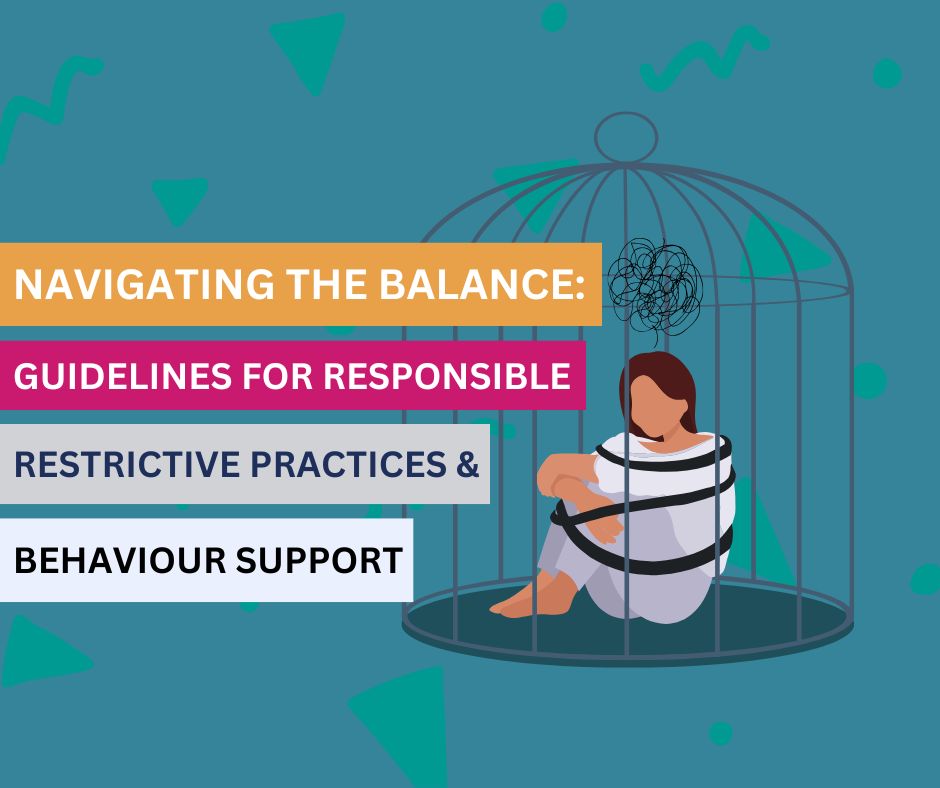Restrictive practices and behaviour support are crucial components in ensuring the safety and well-being of individuals who exhibit challenging behaviours, often within disability care, mental health, or aged care settings.
While the goal is to enhance quality of life and promote positive behaviour changes, ssupport workers should be aware that certain strategies should be used as a last resort and with the guidance of a qualified professional team. This article aims to delineate effective methods while highlighting those that should be avoided. Through this, KC Skills Centre seeks to promote a deeper understanding of the best restrictive practices and behaviour support in the field, empowering support workers and caregivers to enhance their approaches.

What to embrace
Prioritise person-centred support: The core of behaviour support should focus on understanding the individual’s needs, preferences, and triggers. Always seek to provide person-centred care that empowers the individual rather than unnecessarily controlling or limiting their actions.
Use Positive Behaviour Support (PBS) approaches: Positive Behaviour Support is an evidence-based approach aimed at improving an individual’s quality of life and reducing challenging behaviours without the need for restrictive practices. This includes developing tailored strategies that promote desirable behaviours and address the underlying causes of challenging behaviour.
Ensure transparency and consent: When implementing behaviour support plans, always seek informed consent from the individual or their legal guardian. Where restrictive practices are necessary, ensure transparency about why they are being used, for how long, and under what conditions. Keep everyone, including family members, informed and engaged in the process.

Review regularly: Restrictive practices should always be temporary and reviewed regularly to assess their effectiveness and necessity. Frequent reviews help to ensure restrictions are gradually reduced and eventually removed, where possible.
Seek specialist advice: Complex behavioural needs often require input from specialists such as psychologists, occupational therapists, or behaviour support practitioners. These professionals can offer insights and interventions beyond basic care, ensuring individuals receive holistic, well-informed support.
Document everything: Detailed documentation is essential when implementing restrictive practices. This includes keeping records of the behaviour support plan, the circumstances that led to restrictive interventions, and ongoing monitoring. Documentation is critical for accountability and future care planning.

What to avoid
Using restrictive practices as a first option: Restrictive practices should never be the first response to challenging behaviour and should only be used after all other non-restrictive interventions have proven ineffective. Always explore alternative ways to manage challenging behaviour before resorting to restrictions.
Violating human rights: Restrictive practices can sometimes infringe on an individual’s basic human rights, like freedom and dignity. Everyone has the right to live free from unnecessary restrictions, and any form of restraint or seclusion must be handled with care and respect.
Overlooking the root cause: Behaviours of concern are often expressions of unmet needs, pain, and emotional distress. Focusing solely on controlling the behaviour without addressing the root cause may worsen the situation. A thorough assessment is needed to uncover and address the underlying emotional, environmental, or medical issues.

Forgetting to de-escalate: De-escalation techniques should always be the primary strategy for managing challenging behaviours. Calm communication, environmental modifications, and providing space for the individual to express their needs are effective ways to prevent escalation. Avoiding reactive measures can prevent the situation from becoming more challenging.
Overusing medication: Medication should not be over-relied on as a form of behaviour management. Psychotropic drugs, for instance, are sometimes prescribed to manage aggressive behaviours, but this approach should only be used when necessary and under medical supervision. Behavioural strategies should always be prioritised over pharmacological interventions.
Implementing practice without proper training: Staff responsible for caring for individuals with challenging behaviours must be appropriately trained in behaviour support and restrictive practices. Without adequate training, there is a risk of misusing restrictive interventions, which can lead to physical or psychological harm. Fortunately, organisations such as KC Skills Centre have a course dedicated to Restrictive Practices and Behaviour Support. Visit the course page on our website for more information.

Restrictive practices and behaviour support must be handled with care, compassion, and a focus on the individual’s best interests. By following these guidelines, care providers can ensure they support individuals respectfully, ethically, and legally compliant. With person-centred care, positive interventions, and minimal use of restrictive practices, individuals can experience a higher quality of life and the opportunity for greater independence.
At KC Skills Centre, we are committed to empowering support workers in the field with the knowledge and skills necessary to implement best practices. We aim to enhance the lives of those we serve while promoting a culture of respect and dignity within all care settings. If you want to learn more about restrictive practices and behaviour support, see our course page, contact us at (08) 8340 6875, or fill out an enquiry form via the website.


